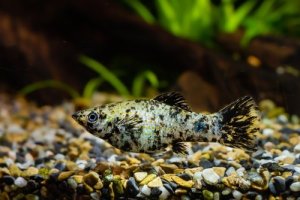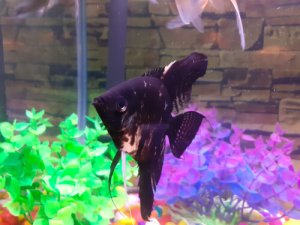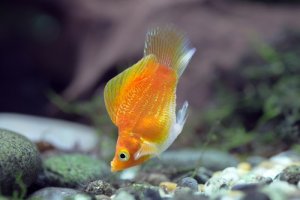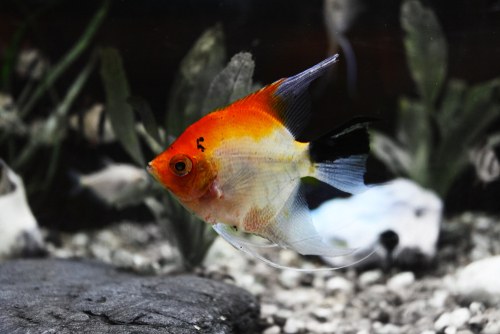
Angelfish are among the most sort after types of freshwater fish kept by aquarium enthusiasts. Their graceful swimming, diverse colors, and hardy survival traits make them comfortable for beginner fish owners. As members of the Cichlidae family, they can live for up to a decade in an aquarium.
With all the unique experiences that come with angelfish, you’ll also need to be aware of specific problems that can develop among them. For example, you should be especially concerned when your angelfish is not eating anything. In such situations, there are certain things to observe in your tank and on your fish. This will help determine the cause of the problem and the right solution to address the issue.
In this article, we’ve compiled some of the most common reasons why you might deal with an angelfish not eating anything.
Angel Fish Not Eating: 6 Reasons Why
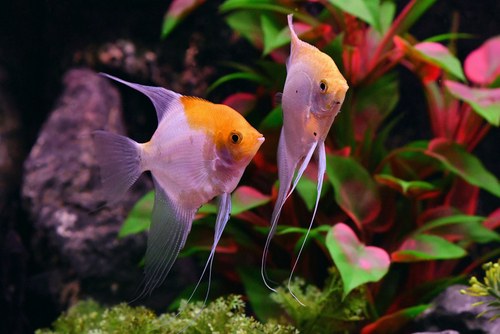
1. Poor Feeding Practices
Angelfish are omnivores; therefore, they tend to hop onto whatever edible substance that comes into their tank. Of course, various food options are perfectly digestible, but understanding the dietary needs of an angelfish is the key to keeping them alive in a conducive space.
One quirk about taking care of angelfish is the fact that no two are the same. Even if they are from the same clutch of eggs, their favored meals can look totally different. Giving your angelfish too much food is also a practice that is bound to be harmful to its feeding habits. They naturally stop eating after a full meal.
2. Poor Water Quality
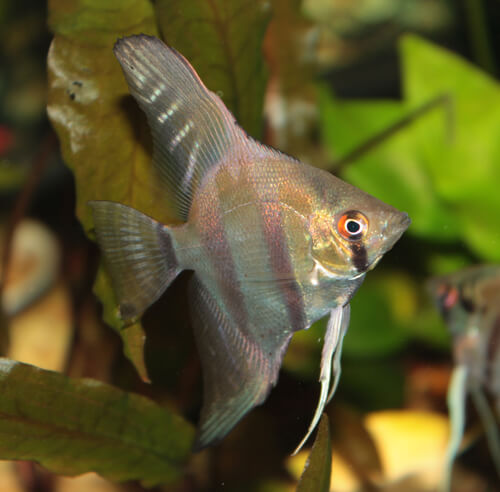
Water quality is one of the first things to check for when your angelfish refuse to eat anything. These aquatic pets tend to lose their appetites when the water in the tank is unsafe. Being exposed to high levels of ammonia and nitrite is what you’re mainly going to be dealing with if your water quality isn’t well-adjusted.
Angelfish need a pH between 6.0 and 8.0. Ultimately though, you’ll want to be somewhere in the middle of those numbers. Meanwhile, there’s also a big concern for angelfish appetites due to their endothermic nature. They tend to get uncomfortable when the external temperature is not adequate, leaving them unable to maintain suitable internal temperatures.
When they are uncomfortable with temperatures, angelfish tend to be extremely sluggish and seem to always be sleepy. Without a lot of activity, their need to eat reduces, which eventually affects their stress levels, one of the causes of angel fish illness. Physical signs of discomfort in the water are shown through white spots on its body, a red hue on the gills, and noticeably labored breathing.
When this poor water quality is left unattended, things can worsen for the health of your fish, leading to potential deaths within the population. In addition, it’s important to note that infections from poor water quality can affect other fish in the tank.
3. Angelfish Is Anxious Due to Its Environment
Angelfish can easily become nervous, so much so that it can result in your angelfish not eating. If you recently introduced your angelfish to the tank, it is going to take some time before there’s some freedom in its movement.
You should be more observant of your fish if there’s a pecking order within your tank. Angelfish may be docile most of the time, but they have an element of aggression that tends to be displayed within their social hierarchy. They can escalate to fights using their tails and mouths when in dispute. Weaker angelfish will be reluctant to eat out of fear.
These freshwater fish are also quite intelligent, as they are able to communicate using chemical signals in their urine and waste.
4. Sickness
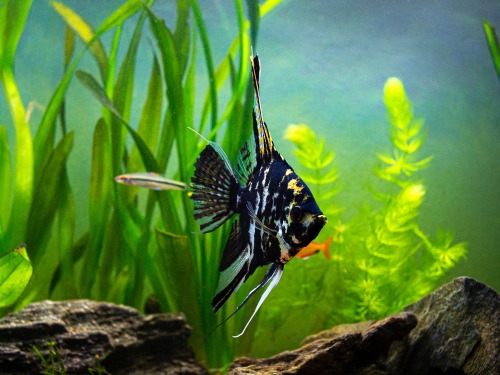
When humans are ill, food can sometimes be unappealing. Sometimes it even reeks and can make you turn your nose in disgust. Similarly, fish also experience these reactions when dealing with poor health conditions. One of the notable signs of illness is your fish not swimming to the surface like it usually does during feeding.
A dwindling appetite can be traced to other common signs of illness, such as a frayed appearance, isolating red marks on the body, labored breathing, abnormal swimming patterns, and general sluggishness. However, finding a diagnosis for the illness is detrimental to your pet as prolonged sickness is one the leading causes of angel fish death.
5. Your Angelfish Is Gravid
Unlike other fish, such as guppies, angelfish are not livebearers. They are actually gravid, which means they develop, carry, and lay eggs. Female angelfish bodies change during gestation, making them lose their appetites, tire quickly, and spend more time hiding. Don’t be too disturbed when they are not eating. They understand best when their body needs nutrition.
6. Stress
When an angelfish is stressed out, they might suddenly refuse to eat anything you have available. Stress levels can suddenly get dangerously high when your fish goes through erratically shifting conditions or drastic changes. For example, being newly introduced to a tank, unregulated water parameters, insufficient space, and even competing for food against bigger and more aggressive fish lead to angelfish not eating.
How To Prevent Your Angelfish From Losing Its Appetite
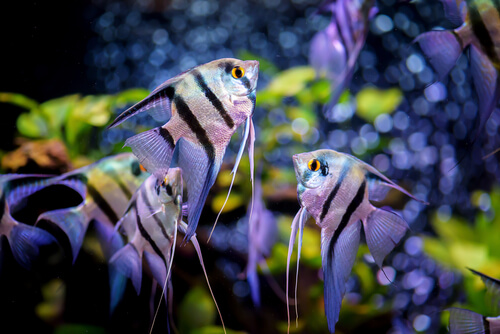
Now that we understand the possible reasons for angelfish not eating, these are some handy tips to prevent your favorite pal from losing its appetite.
1. Adopt Proper Feeding Practices In Angelfish
If you’re dealing with an angelfish not eating, maybe you need to look at how it reacts to new food choices being introduced to the tank. They tend to gobble up food quickly, so any angelfish that displays disinterest in food might simply need some variety for its palette.
Even though they can eat plants, they tend to gravitate towards smaller fish, invertebrates, and insects. Some angelfish tend to eat at the bottom of a tank, while others are surface feeders. If your fish doesn’t swim to the surface at all, your angelfish could be a bottom feeder. Angelfish with these tendencies don’t feel comfortable eating while floating at the surface of a tank.
If you find lots of food at the bottom of your tank, it’s best to do a water change and adjust the parameters to avoid bacteria. To reduce waste, don’t overfeed your fish; the leftover food at the bottom increases the ammonia levels of the water when tanks are not cleaned regularly. In addition, overfeeding can cause swim bladder issues in your angelfish. Giving your fish a little extra may sound like a good idea, but it actually stunts its growth and drastically reduces its lifespan.
2. Be Diligent With The Tanks Water Quality
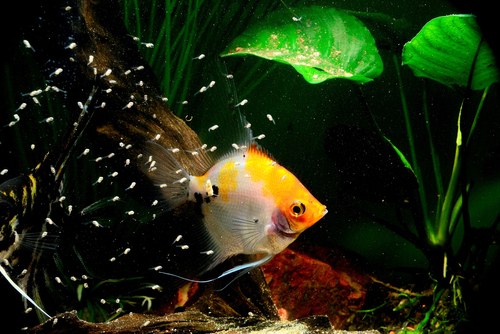
Poor water quality is something you’re going to want to prevent. Regularly changing at least 50% of the water in your aquarium is an excellent way to stay on top of things. There’s also an added benefit of owning a kit to test water quality and relevant parameters.
Quarantining your angelfish is what you should do if you suspect that it is not eating due to harmful bacteria or discomfort in the water. Before returning it, ensure the water quality is ideal. If you’re not maintaining good water quality, you’re likely to start losing fish, as this is one of the potential causes of angelfish death.
3. Attend To Whatever Is Causing Your Angelfish Anxiety
New angelfish, even adult ones, tend to do what they can to feel secure in a tank, even if that means neglecting valuable nutrients from food sources. Give the fish some time to settle in and create a few practical hiding spots to give it some privacy when it feels shy. After a few weeks of settling in, your fish will be more open to snacking on meals.
If you notice that there’s a power play going on in the tank, be sure to have a reasonable abundance of resources to avoid squabbles. Constant anxiety is what could be one of the causes of angelfish illness.
How To Deal With A Sick Angelfish
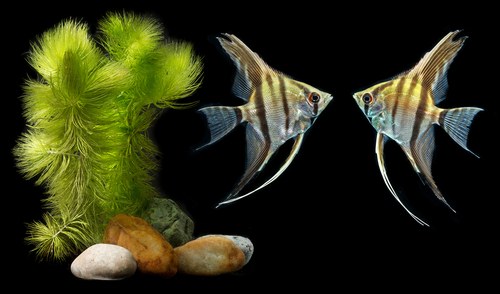
If your angelfish displays any sickness symptoms, it’s time to address it by administering treatment. First, book a consultation with an experienced aquatic veterinarian close to you. Once you’ve got a valid diagnosis, gather the medication and begin treatment immediately. If you don’t have access to a vet yet, be sure to isolate the infected fish from the main tank to avoid infecting the others.
How To Help Your Gravid Angelfish
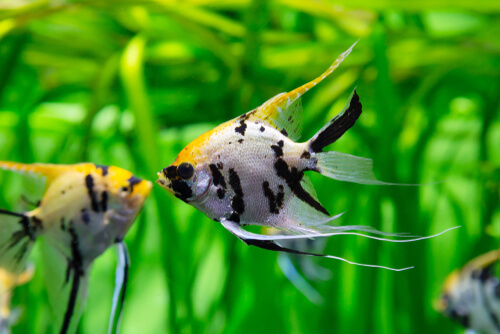
If you think an angelfish is about to lay eggs, it might be time to move her to an isolation tank so that she doesn’t develop symptoms of stress. You don’t want your pet to be subjected to any causes of angelfish illness during this time. Water parameters in this new tank should receive the utmost priority, matching the conditions in your main tank. That way, when the eggs hatch, they’ll be able to thrive in their environment.
Remove Any Stresses
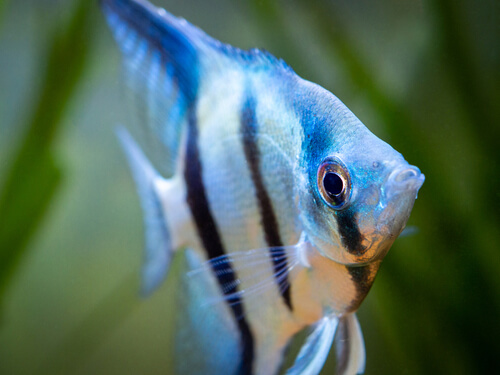
If your angelfish is stressed, you’re going to need to somehow find a way to empathize with it and figure out the problem currently affecting its well-being. From illness to overfeeding, countless minor things can determine whether your fish survives the stress.
Don’t be scared to experiment with the environment. Adjust anything that could be causing stress in your fish.
What Kind Of Habitat Can Angelfish Thrive In?
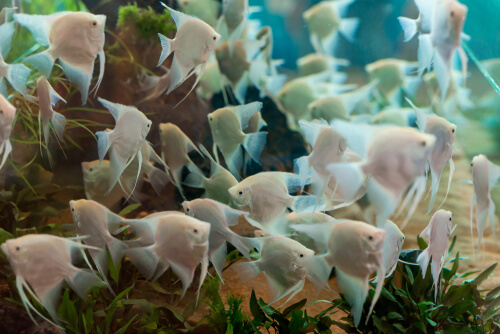
Originally from tropical South America, angelfish are definitely among the most varied types of fish in terms of patterns. This includes zebra patterns, leopard, albino, and pure colors like black.
Certain types of angelfish can reach up to 18 cm long and 33 cm high, so your tank has to be quite liberal with the space and amount of water present. If you have up to four adult angelfish along with other species in a tank, you should use a tank that can hold at least 29 gallons. When your population increases, be prepared to observe territorial behavior among the fish.
Water temperature should be around 78-84 degrees Fahrenheit for them. Taking care of their pH doesn’t require too much from you since they can live in levels between 6.0 and 8.0.
Final Thoughts
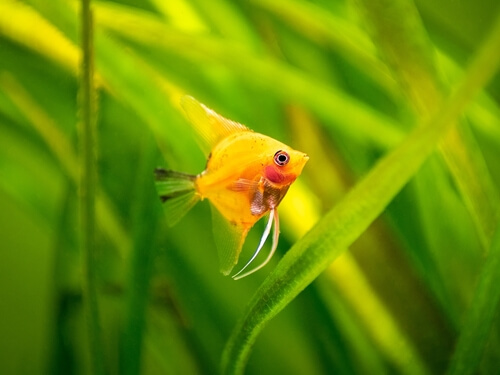
When dealing with an angelfish not eating, you should be able to detect the likely problem by going through the reasons indicated in this article. Sometimes, the problem is a simple case of overfeeding. Other times, there are subtle plays in the hierarchy of the tank. As an aquarium owner and fish lover taking care of this ecosystem you’ve developed is all your fish needs to be happy.


